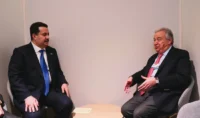Less politics
Iraqi government seeks development focus for UNAMI
BAGHDAD — Hisham Al-Alawi, Iraq’s deputy foreign minister for political planning, said Monday that the Iraqi government wants to focus on development issues and doesn’t need political support from the United Nations Assistance Mission for Iraq (UNAMI), citing the political system’s “sufficient maturity.”
During his remarks at the Rafidain Forum, Al-Alawi recognized UNAMI’s contributions to Iraq but stressed that the political system’s maturity has made UNAMI’s political involvement unnecessary.
“The Iraqi government believes that the focus should now be on developmental issues and economic reforms,” Al-Alawi said, suggesting that UNAMI’s role, if any, should be ‘non-political’.
He emphasized the importance of supporting Iraqi institutions in achieving the Sustainable Development Goals for 2030, along with various economic reforms.
Al-Alawi pointed out the need to ‘differentiate’ between UNAMI’s political role and its other contributions if the mission continues in Iraq.
UNAMI was established in 2003 by the UN Security Council to support the country’s recovery and development following years of conflict. Over time, UNAMI’s mandate has expanded to include advising on political dialogue, facilitating regional cooperation, promoting human rights, and coordinating humanitarian and development efforts. Despite its broad support, the mission has faced opposition, particularly concerning its political involvement.
Criticism of UNAMI’s political role is multifaceted, reflecting concerns over sovereignty, development priorities, and the influence of external powers in Iraq’s domestic affairs. Negotiations surrounding UNAMI’s mandate renewal have revealed geopolitical dynamics at play, with disagreements on issues like climate change indicating broader concerns over the mission’s scope and impact.
While UNAMI has been instrumental in addressing humanitarian issues, such as explosive ordnance and displacement, its wide-ranging mandate has occasionally sparked resistance. Some of this opposition may stem from a desire to limit international oversight, while other critiques highlight the importance of focusing on Iraq’s immediate development and recovery needs.
Jeanine Hennis-Plasschaert, the head of UNAMI, has announced she expects to step down at the end of May. Her tenure has been marked by efforts to advance inclusive political dialogue and coordinate humanitarian and development aid in a context described as “on a knife edge” due to ongoing regional tensions and internal challenges

